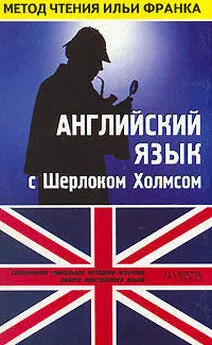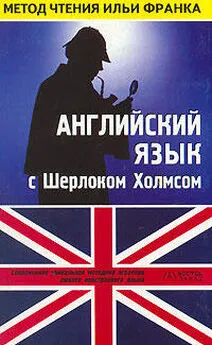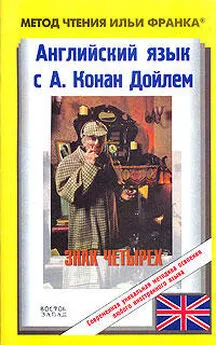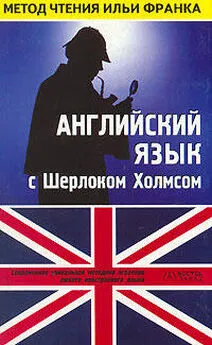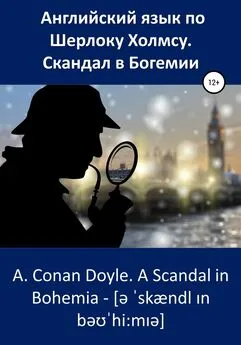Arthur Conan Doyle - Английский язык с Шерлоком Холмсом. Второй сборник рассказов (ASCII-IPA)
- Название:Английский язык с Шерлоком Холмсом. Второй сборник рассказов (ASCII-IPA)
- Автор:
- Жанр:
- Издательство:неизвестно
- Год:неизвестен
- ISBN:нет данных
- Рейтинг:
- Избранное:Добавить в избранное
-
Отзывы:
-
Ваша оценка:
Arthur Conan Doyle - Английский язык с Шерлоком Холмсом. Второй сборник рассказов (ASCII-IPA) краткое содержание
Второй сборник детективных повестей Конана-Дойла о Шерлоке Холмсе, состоящий из:
The Six Napoleons (Шесть Наполеонов)
The Three Students (Три студента)
The Second Stain (Второе пятно)
The Musgrave Ritual (Обряд Месгрейвов)
The Noble Bachelor (Знатный холостяк)
The Beryl Coronet (Берилловая диадема)
The Resident Patient (Постоянный пациент)
Текст адаптирован (без упрощения текста оригинала) по методу Ильи Франка: текст разбит на небольшие отрывки, каждый и который повторяется дважды: сначала идет английский текст с «подсказками» — с вкрапленным в него дословным русским переводом и лексико-грамматическим комментарием (то есть адаптированный), а затем — тот же текст, но уже неадаптированный, без подсказок.
Начинающие осваивать английский язык могут при этом читать сначала отрывок текста с подсказками, а затем тот же отрывок — без подсказок. Вы как бы учитесь плавать: сначала плывете с доской, потом без доски. Совершенствующие свой английский могут поступать наоборот: читать текст без подсказок, по мере необходимости подглядывая в подсказки.
Запоминание слов и выражений происходит при этом за счет их повторяемости, без зубрежки.
Кроме того, читатель привыкает к логике английского языка, начинает его «чувствовать».
Этот метод избавляет вас от стресса первого этапа освоения языка — от механического поиска каждого слова в словаре и от бесплодного гадания, что же все-таки значит фраза, все слова из которой вы уже нашли.
Пособие способствует эффективному освоению языка, может служить дополнением к учебникам по грамматике или к основным занятиям. Предназначено для студентов, для изучающих английский язык самостоятельно, а также для всех интересующихся английской культурой.
Мультиязыковой проект Ильи Франка: www.franklang.ru
От редактора fb2. Есть два способа оформления транскрипции: UTF-LATIN и ASCII-IPA. Для корректного отображения UTF-LATIN необходимы полноценные юникодные шрифты, например, DejaVu или Arial Unicode MS. Если по каким либо причинам вас это не устраивает, то воспользуйтесь ASCII-IPA версией той же самой книги (отличается только кодированием транскрипции). Но это сопряженно с небольшими трудностями восприятия на начальном этапе. Более подробно об ASCII-IPA читайте в Интернете:
http://alt-usage-english.org/ipa/ascii_ipa_combined.shtml
http://en.wikipedia.org/wiki/Kirshenbaum
Английский язык с Шерлоком Холмсом. Второй сборник рассказов (ASCII-IPA) - читать онлайн бесплатно полную версию (весь текст целиком)
Интервал:
Закладка:
“‘I feel that I owe you a great many apologies for my abrupt departure yesterday, doctor (думаю, что должен извиниться: «должен вам огромное множество извинений», доктор, за мой внезапный/резкий уход вчера) ,’ said my patient.
“‘I confess that I was very much surprised at it (признаюсь, я был очень удивлен им) ,’ said I.
“‘Well, the fact is (дело в том) ,’ he remarked (заметил он) , ‘that when I recover from these attacks (что когда я прихожу в себя после этих приступов) my mind is always very clouded as to all that has gone before (мой разум всегда очень затуманен относительно всего того, что случилось раньше) . I woke up in a strange room, as it seemed to me (я очнулся в незнакомой комнате, как мне показалось) , and made my way out into the street in a sort of dazed way when you were absent (и, плохо осознавая свои действия, вышел на улицу, когда вас не было; to make one's way — пробираться, продвигаться; dazed — изумленный, потрясенный, ошеломленный; полубессознательный; absent — отсутствующий) .’
“‘And I (а я) ,’ said the son, ‘seeing my father pass the door of the waiting-room (видя, как отец проходит мимо двери приемной) , naturally thought that the consultation had come to an end (естественно, подумал, что консультация закончилась) . It was not until we had reached home (и лишь когда мы пришли домой) that I began to realize the true state of affairs (я начал понимать истинное положение вещей) .’
“‘Well,’ said I, laughing, ‘there is no harm done except that you puzzled me terribly (ничего плохого не случилось, разве только вы ужасно меня озадачили) ; so if you, sir, would kindly step into the waiting-room (если вы, сэр, пройдете в приемную; kindly — любезно) I shall be happy to continue our consultation (я буду рад продолжить консультацию) which was brought to so abrupt an ending (которая была так неожиданно прервана) .’
departure [dI'pA:tS@], clouded ['klaudId], laughing ['lA:fIN]
“‘I feel that I owe you a great many apologies for my abrupt departure yesterday, doctor,’ said my patient.
“‘I confess that I was very much surprised at it,’ said I.
“‘Well, the fact is,’ he remarked, ‘that when I recover from these attacks my mind is always very clouded as to all that has gone before. I woke up in a strange room, as it seemed to me, and made my way out into the street in a sort of dazed way when you were absent.’
“‘And I,’ said the son, ‘seeing my father pass the door of the waiting‑room, naturally thought that the consultation had come to an end. It was not until we had reached home that I began to realize the true state of affairs.’
“‘Well,’ said I, laughing, ‘there is no harm done except that you puzzled me terribly; so if you, sir, would kindly step into the waiting-room I shall be happy to continue our consultation which was brought to so abrupt an ending.’
“For half an hour or so I discussed that old gentleman’s symptoms with him (полчаса или около того я обсуждал с пожилым джентльменом его симптомы) , and then, having prescribed for him (а затем, прописав ему /лекарства/) , I saw him go off upon the arm of his son (я видел, как он ушел, опираясь на руку сына) .
“I have told you that Mr. Blessington generally chose this hour of the day for his exercise (я уже говорил вам, что мистер Блессингтон обычно выбирал этот час дня для своих прогулок; to choose) . He came in shortly afterwards and passed upstairs (он вошел вскоре после /ухода пациента/ и поднялся наверх) . An instant later I heard him running down (миг спустя я услышал, как он сбежал вниз) , and he burst into my consulting-room like a man who is mad with panic (и ворвался в мой кабинет как человек, обезумевший от паники) .
“‘Who has been in my room (кто был в моей комнате) ?’ he cried.
“‘No one (никто) ,’ said I.
“‘It’s a lie (это ложь) ! he yelled (крикнул он) . ‘Come up and look (поднимитесь и посмотрите) !’
“I passed over the grossness of his language (я оставил без внимания грубость его слов; to pass over — проходить; переправляться; пролетать; пропускать, оставлять без внимания; обходить молчанием) , as he seemed half out of his mind with fear (так как, казалось, он обезумел от страха: «наполовину вышел из ума от страха») . When I went upstairs with him (когда мы поднялись с ним) he pointed to several footprints upon the light carpet (он показал на несколько следов на светлом ковре) .
“‘D’you mean to say those are mine (вы хотите сказать, это мои /следы/; d’you = do you) ?’ he cried.
symptom ['sImpt@m], language ['l&NgwIdZ], carpet ['kA:pIt]
“For half an hour or so I discussed that old gentleman’s symptoms with him, and then, having prescribed for him, I saw him go off upon the arm of his son.
“I have told you that Mr. Blessington generally chose this hour of the day for his exercise. He came in shortly afterwards and passed upstairs. An instant later I heard him running down, and he burst into my consulting‑room like a man who is mad with panic.
“‘Who has been in my room?’ he cried.
“‘No one,’ said I.
“‘It’s a lie! he yelled. ‘Come up and look!’
“I passed over the grossness of his language, as he seemed half out of his mind with fear. When I went upstairs with him he pointed to several footprints upon the light carpet.
“‘D’you mean to say those are mine?’ he cried.
“They were certainly very much larger (они явно были намного больше) than any which he could have made (чем те, которые мог оставить Блессингтон) , and were evidently quite fresh (и были, очевидно, совсем свежие) . It rained hard this afternoon, as you know (как вы знаете, сегодня вечером шел сильный дождь) , and my patients were the only people who called (а мои пациенты были единственными людьми, заходившими /в дом/) . It must have been the case, then (значит, дело было так) , that the man in the waiting-room had, for some unknown reason (что человек в приемной по какой-то неизвестной причине) , while I was busy with the other (пока я был занят с другим) , ascended to the room of my resident patient (поднялся в комнату моего постоянного пациента) . Nothing has been touched or taken (/в комнате/ ничего не трогали и не взяли) , but there were the footprints to prove (но следы свидетельствовали) that the intrusion was an undoubted fact (что вторжение было несомненным фактом) .
“Mr. Blessington seemed more excited over the matter (казалось, мистер Блессингтон был больше взволнован этим делом) than I should have thought possible (чем я счел бы возможным = чем можно было бы ожидать) , though of course it was enough to disturb anybody’s peace of mind (хотя, конечно, этого было достаточно, чтобы нарушить душевный покой кого угодно) . He actually sat crying in an arm-chair (он просто сел в кресло, плача) , and I could hardly get him to speak coherently (и я едва смог заставить его говорить связно = у меня не получалось добиться от него связной речи; coherent — сцепленный, связанный; связный) . It was his suggestion that I should come round to you (это было его предложение = это он предложил обратиться к вам) , and of course I at once saw the propriety of it (и, конечно, я сразу же согласился: «увидел уместность этого») , for certainly the incident is a very singular one (потому что это происшествие действительно странное) , though he appears to completely overtake its importance (хотя, как мне кажется, мистер Блессингтон сильно преувеличивает его значение; to overtake — обгонять) . If you would only come back with me in my brougham (если только вы вернетесь со мной в экипаже) , you would at least be able to soothe him (вы, по крайней мере, сможете успокоить его) , though I can hardly hope that you will be able to explain this remarkable occurrence (хотя вряд ли можно надеяться, что вы сумеете объяснить это удивительное происшествие) .”
ascended [@'sendId], propriety [pr@'praI@tI], though [D@u], soothe [su:D]
“They were certainly very much larger than any which he could have made, and were evidently quite fresh. It rained hard this afternoon, as you know, and my patients were the only people who called. It must have been the case, then, that the man in the waiting‑room had, for some unknown reason, while I was busy with the other, ascended to the room of my resident patient. Nothing has been touched or taken, but there were the footprints to prove that the intrusion was an undoubted fact.
“Mr. Blessington seemed more excited over the matter than I should have thought possible, though of course it was enough to disturb anybody’s peace of mind. He actually sat crying in an arm-chair, and I could hardly get him to speak coherently. It was his suggestion that I should come round to you, and of course I at once saw the propriety of it, for certainly the incident is a very singular one, though he appears to completely overtake its importance. If you would only come back with me in my brougham, you would at least be able to soothe him, though I can hardly hope that you will be able to explain this remarkable occurrence.”
Читать дальшеИнтервал:
Закладка:
